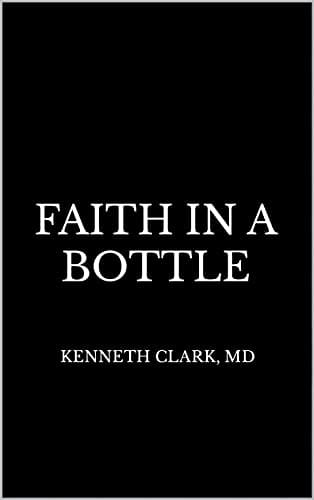- Home
- Spiritual Life
- Faith in a Bottle

Faith in a Bottle
Editor’s Note: Accepting Christ means more than receiving forgiveness—it means stepping into a new life, leaving your past behind, and living with a renewed conscience. But for those who once tried to find faith in a bottle, true repentance also calls for making amends and healing the damage left in their wake. This honest reflection wrestles with the tension between grace, responsibility, and the lifelong journey of restoration.
So, if you are offering your gift at the altar and there remember that your brother has something against you, leave your gift there before the altar and go. First be reconciled to your brother, and then come and offer your gift.
– Matthew 5:23-24 (ESV)
Making the commitment to serve the King, to accept Jesus, and follow God’s direction in my life is the greatest thing I, or any person, can do. When we do this, when I do this, it brings with it a transformation of mind and spirit that knows no parallel. It charges up my soul to know that despite my sufferings, failures, and multitude of transgressions, God has accepted me as I am, forgiven me of my sins, and given me a vital role in His plans to move forward and advance His Kingdom for His purpose. I feel grateful to know that God has forgotten about my past and asks me to look only towards the future. To know that my regrettable past, in the eyes of the Lord, has been buried too deep to ever find again, is a tremendous relief and a very precious gift. This opens the door for me to remain in the present and stay directed only towards the future. God’s word tells me so.
Brothers, I do not consider that I have made it my own. But one thing I do: forgetting what lies behind and straining forward to what lies ahead, I press on toward the goal for the prize of the upward call of God in Christ Jesus. – Philippians 3:13-14 (ESV)
To me, accepting Jesus as my savior and acknowledging God as my ultimate King means more than Him just forgetting about and forgiving me of my past. This means that God looks at me in an entirely different light. According to the scripture, God sees me as a brand-new creation, one with a brand-new life and a brand-new purpose.
This means that anyone who belongs to Christ has become a new person. The old life is gone; a new life has begun! – 2 Corinthians 5:17 (NLT)

As much as I embrace this gift of renewal, restoration, and the redefined creation God sees me to be, I still have some issues that prevent me from keeping my head looking forward and avoiding my past. I can’t completely forget what lies behind me. I believe I can learn to forgive myself and leave my past behind me, but to do so abruptly and purposefully seems almost as selfish as my past itself. Despite what the Apostle Paul states, I cannot, nor will not, right now, leave my past behind me. Even though God has forgotten about my past, many of the people who suffered because of my past still remember it. I need to reconcile my past, make it right, before I can walk away from it completely.
There are a couple of reasons I need to right my wrongs before I dismiss what I’ve done and march on, one of which is simple repentance. Alcoholism destroyed my conscience because a mind governed by the ego is only concerned with itself. When I’m living to serve myself, the cares, feelings, and welfare of others are of no real concern. It’s not a conscious decision to not care about others; it just comes with the disease. True selfishness knows no love for others, and definitely knows no guilt about having hurt others. This all changes when Christ becomes the driving force in a man’s life and his heart is filled with the spirit. When I came to really know the Lord and commit to a life led by him, that came with a restored conscience. The feelings and thoughts of others, their well-beings, mattered to me again. Nowadays, I definitely care about the concerns and feelings of the people in my life, including those who paid the penalties of my previous life. This troubles me greatly. The Bible repeatedly talks of repentance for our sins. Numerous scriptures mention it.
Repent therefore, and turn again, that your sins may be blotted out. – Acts 3:19 (ESV)
and,
I have not come to call the righteous but sinners to repentance. – Luke 5:32 (ESV)
There are dozens of scriptures calling us to repent, but what does this mean? Merriam-Webster defines repent as “to turn from sin and dedicate oneself to the amendment of one’s life.” There it is – amend. The three-word definition of amend is “to make right.” So, at least according to the Merriam-Webster dictionary repentance means to turn from our wrong ways and make right our life. I personally believe this means making things right in the path before us, but also cleaning up the messes we may have created and left in the trail behind us. To make things right doesn’t mean some things, it means all things, if possible. I need to make things right with God by making things right with the folks I’ve troubled or harmed. This begs the question as to what rights a wrong. Another definition of repent (dictionary.com) is to “feel or express sincere regret or remorse about one’s wrongdoing or sin.” I have certainly felt and expressed sincere remorse for my wrongdoings and sins to God, but in order to make my wrongs right in the broadest sense of the word, I need to at least express this remorse to those I have hurt. If I am going to repent, I need to go all the way and repent to everyone involved, not just God.
Another reason amends are absolutely necessary in order to walk God’s path with integrity is because the scripture actually tells me to (Matthew 5:23-24). What I believe the scripture is telling us is that if while we are approaching God, I realize that someone has something against us, we need to take care of that business first and then give our gifts to the Lord. It’s not often that someone has something against me for no reason at all. If my brother is holding a grudge, I’m sure it’s for a reason, something for which I’m responsible. For alcoholics, this is especially true. We piss a whole lot of people off in a whole lot of ways. The Scripture specifically tells me to reconcile with these people. What does that mean, exactly? I’m sure you can get a lot of different understandings of that word from a lot of different people, so I’ll use the dictionary definition to eliminate any bias. Merriam-Webster defines the word reconcile to mean “to restore to friendship or harmony.” Remaining sober, continuing to follow the path of recovery, and being obedient to God’s will are both crucial and essential to honoring my commitment to the Lord. I cannot honor this commitment either drunk or being led by my ego. But just remaining sober and committed to God may bring harmony back to my relationship with God, but not necessarily reconcile anything with someone I have screwed over. To bring harmony back to a relationship that is in disharmony will take consistency, but also some acknowledgment and a little action, as well. I have to be willing to do that.
I also need to make amends with those I’ve harmed because making amends, as I see it, falls directly under the responsibilities that comes with my commitment to loving others — helping others to find relief from their burdens. The burden I’m speaking of is the burden of resentment. Few things poison the soul like resentment. Whether against myself or others, the ill-feelings and spiritual unrest that comes from resentments can keep me distracted from God and repeatedly bring me misery as well. The resentments in my life are numerous and I know how harmful and crippling they have been. I know how my resentments have even helped open the doors for the demon of alcoholism to enter and take reign. It’s very easy for me to think of resentments from a very selfish perspective. I need to be very mindful that resentments aren’t exclusive to me or even alcoholics. Everyone can harbor these destructive thoughts and feelings, whether they’re alcoholics, non-drinkers, Christians, or not. In loving others, I need to make efforts to help others who may be suffering from their own resentments, particularly if they are against me. The only way I can effectively do this is by acknowledging what I’ve done, expressing my remorse, and asking what, if anything I can do to repair the damage and heal their wounds so that they can be free of the burden of resentment of me, and move forward in their own lives and callings of God.
Anyway I look at it, making amends with the people I have hurt over the course of my life, and particularly during my alcoholism, is not something optional that I might get bonus points or a gold star for. Making amends is absolutely essential if I’m serious about ditching the mask of a Christian I wore for many years and starting to actually live like one. It comes down to bucking up despite my fears or false pride and making things right — for them, myself, and God. Whether simple repentance, reconciliation, or relieving another of the burden of resentment, my making amends really comes down to one thing — admitting to God and another person that I’ve done wrong. I did wrong. I spoke wrong. I was wrong. This is one of the most difficult things for any person to do — to admit they were wrong.
It was Russian author Count Lev Nikolayevich Tolstoy (Leo Tolstoy) who wrote, in his book, What is Art, the following:
“I know that most men, including those at ease with problems of the greatest complexity, can seldom accept even the simplest and most obvious truth if it be such as would oblige them to admit the falsity of conclusions which they have delighted in explaining to colleagues, which they have proudly taught to others, and which they have woven, thread by thread, into the fabric of their lives.”
In addition to being almost poetic and extremely well-written, these words state a near-universal fact, one which holds as true today as it did over a hundred years ago when they were written. What these words mean is simply that most men (or women), no matter how intelligent, no matter how gifted or insightful, no matter how skilled or talented will refuse to admit a stark and blatantly obvious truth that stares them boldly in the face if in doing so they would be admitting they are wrong. People just don’t like to, and often will not, admit they are wrong. I have come to learn through my own experience of life and loss that I am no exception to this fact. I think few words, if any, speak more about my past than these. Simply put, today I see with crystal clarity the undeniable truth that I was wrong … about a lot of things. Today, and every day, my goal is to both admit these wrongs and do everything I can to make them right to God and others.
I suppose there is a selfish piece in all of this as well. It is true — I believe — that carrying out God’s will means righting my wrongs, reconciling with others, repenting for what I have done, and restoring emotional health in another person. But I must also restore harmony and friendship with others if I can ever be free of the remorse and be right with myself. At the end of each day there are only two individuals I must face, no matter how willing or unwilling, and they are God and me. It is most difficult to ignore my horrid self while so much of it lingers in the past. The footprints of much of my sins are deeply embedded in the ground others walk today. To live as a man with God-conscience, I must do my best to erase these footprints as best I can. It’s not only the right thing to do, but it is the only way I can truly minimize the regret, self-resentment, guilt, and shame that can weigh down and anchor my ego into something I cannot move. This is the only way I can ever truly be free to approach God, commit to God with a clean heart and conscience, and be of any kind of real use to Him or His Kingdom. I’m not perfect at this, nor even very good, but I will try again and again. If it takes me a lifetime, I will rid myself of ego and right my wrongs … one at a time.
…
Order your copy of Faith in a Bottle by Kenneth Clark
You’re not who you used to be … and your journey is just beginning! Step into what’s next.
Trending Now
Sign up today for your Inspiration Today Daily Newsletter
Supercharge your faith and ignite your spirit. Find hope in God’s word. Receive your Inspiration Today newsletter now!
Kenneth Clark
Kenneth Clark grew up in Erie, Pennsylvania. He holds degrees in both electrical engineering and medicine (doctorate). Today, recommitted to God and recovery, Kenny again lives a sober life in Erie, Pa. He no longer practices forensic medicine.
Related Articles
February 20, 2026
Stepping Out in Faith When God Calls You to the Impossible
Stepping out in faith often feels uncomfortable—especially when God calls you toward something that…
February 20, 2026
Finding Joy Is a Choice—Even When Life Is Hard
Sorrow doesn’t pause life—and neither does joy. If you’ve ever wondered how to find joy in…
February 19, 2026
The Secret to Supernatural Joy in Your Life
What if joy wasn’t tied to circumstances at all? Supernatural joy—the kind Jesus promised—can…
February 18, 2026
Ash Wednesday: Ashes to Ashes, Dust to Dust
Ash Wednesday invites believers to pause, remember their need for repentance, and prepare their…
Next Steps To Strengthen Your Walk
Inspiration Today Newsletter
Supercharge your faith and ignite your spirit. Find hope in God’s word. Receive your Inspiration Today newsletter now!
Christian Articles
Find articles to strengthen your walk and grow your faith. We have a wide range of topics and authors for you.
Submit A Prayer Request
We are here for you. Simply click on the button below to reach us by form, email or phone. Together we will lift our hearts and voices with you in prayer.





